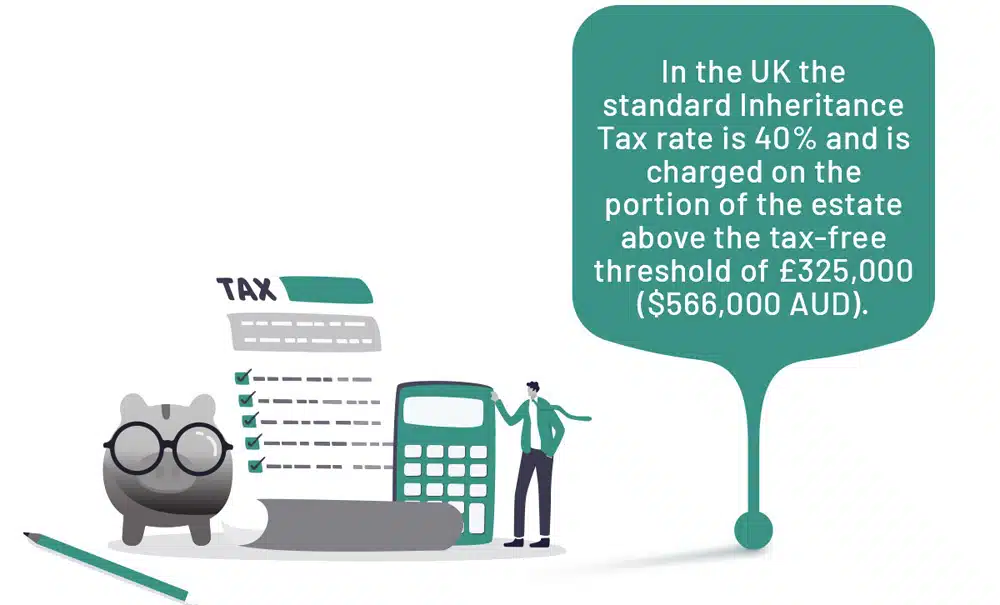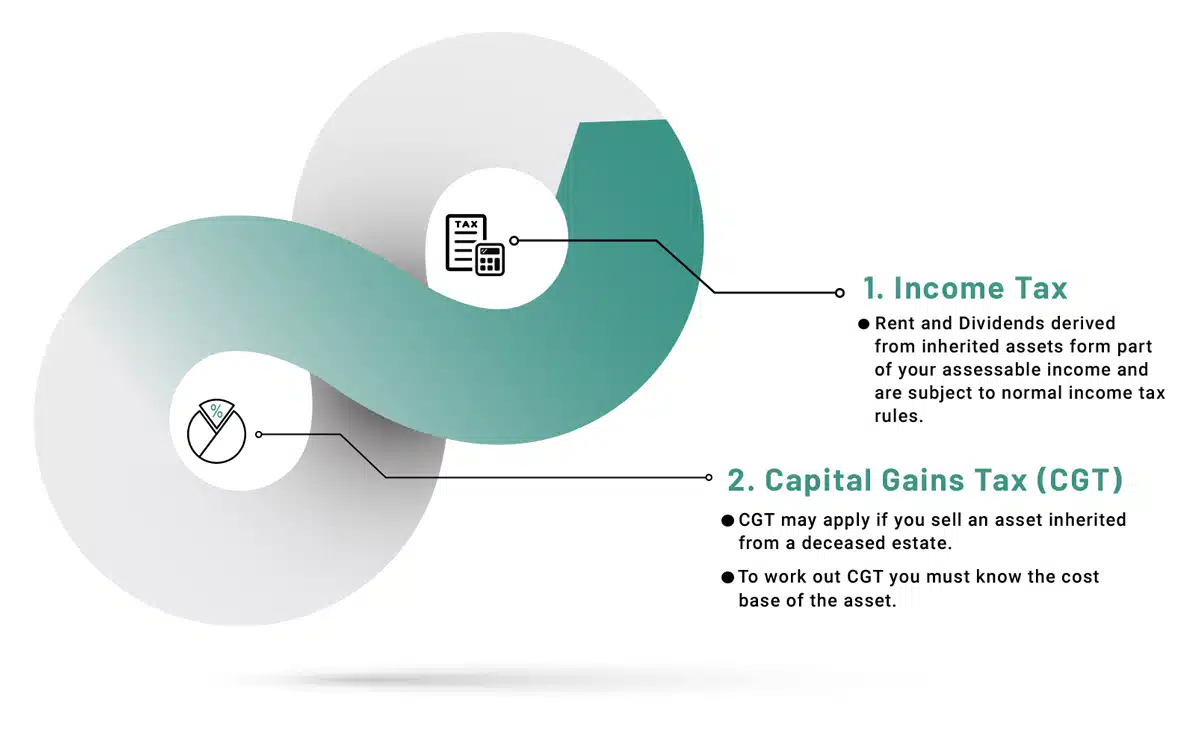There is no inheritance tax in Australia. Federal and State governments do not tax the value of a deceased estate and beneficiaries of a Will are not required to pay a tax on their entitlement.
Although there is no direct tax on inheritances, tax obligations may arise for:
- The estate before it is distributed to beneficiaries
- The beneficiaries once they receive their inheritance
It is important for executors to understand the tax obligations that may arise when administering a deceased estate and for beneficiaries to be aware of the financial consequences of inheriting estate assets. This blog provides practical and relevant information regarding some of the main tax considerations when deceased estates are administered and then inherited.
Probate Consultants is a premium resource for information on Grants of Representation and deceased estates. Our mission is to assist Self-Represented Applicants (SRAs) apply for Probate and Letters of Administration, making the process Fast, Affordable and Easy in most jurisdictions.
"*" indicates required fields
Do you pay tax on an inheritance?
You do not pay tax on your inheritance in Australia. Unlike many countries around the world, Australia does not impose a tax on deceased estates or beneficiaries who inherit assets under a Will.
Whilst there is no inheritance tax or estate tax in Australia, beneficiaries will need to consider their personal tax liability once they have received their inheritance and taken ownership of the estate assets. Executors must also be aware of the tax implications of administering a deceased estate.

Tax obligations – The Estate and Executors

There is no direct estate tax in Australia, however, there may be tax implications for a deceased estate where it earns income before it is fully administered and distributed to beneficiaries.
In the first three income years, tax is payable by an estate where it earns income over the tax-free threshold for individuals. In income year four or later, tax is payable on all estate income.
Estates are treated as trusts for tax purposes and executors are responsible for paying tax on net income that is derived before the estate is finalised and distributed unless beneficiaries are presently entitled to that income.
Types of estate income:
- Rent
- Dividends
- Non-exempt Capital Gains
- Superannuation Death Benefit payable to the estate
- Employment termination payments
Learn more about types of estate income on the ATO website.
Tax Rates
The following Tax Rates apply to deceased estates:
- Individual Tax Rate for the first three income years
- This includes the full tax-free threshold
- This tax rate is concessional
- Tax Rate for income years four and later
Please note: Different tax rules apply where estate assets are distributed to:
Once all assets have been collected, debts paid and any tax liability settled, the net estate is then distributed to the beneficiaries of the Will. This finalises the estate and the beneficiaries are now responsible for tax obligations that may arise from inheriting estate assets.
Tax obligations – Beneficiaries inheriting assets under a Will

When a beneficiary inherits under a Will, they take ownership of the estate assets they are entitled to. There is no tax on the value of the entitlement itself, however, owning the assets may give rise to personal tax implications.
Personal Tax implications depend on:
- The type of asset inherited
- The use of the asset
- The sale or transfer of that asset
Once a beneficiary owns the asset normal tax rules apply, and they need to consider how the use of the asset, or its subsequent sale contribute to their assessable income.
Tax obligations when inheriting assets under a Will:

Learn more by following the links below:
When do I get my inheritance?
Beneficiaries can expect to receive their inheritance within 12 months of death of the testator (Will maker). Executors are expected to finalise an estate within this time, however, may take longer where the estate administration is complex or legal claims are made.
Estate Administration – the process of getting an inheritance
The executor of a Will is responsible for administering a deceased estate. This involves:
- Collecting all property and assets
- Paying any debts (including the estate’s tax liabilities)
- Distributing assets according to the Will
The estate is finalised once the executor has distributed the net estate to the beneficiaries according to the terms of the Will. During the estate administration, the executor is responsible for any tax on the estate’s net income before the estate is fully administered unless beneficiaries are presently entitled.
Read more about the duties of an executor here:

How much tax do I pay on inherited superannuation?

A deceased person’s Superannuation is paid as a Death Benefit to either:
- Their nominated beneficiary(s)
- Dependants under Superannuation Law
- Their estate’s Legal Personal Representative (LPR)
- The executor where there is a Will
- The Administrator when there is no Will
According to the ATO website: “Superannuation law sets out who a death benefit is payable to, while taxation law sets out how a death benefit is taxed.”
Super Death Benefit Payable to Nominated Beneficiaries or Dependants
Where a Super Death Benefit is payable to a nominated beneficiary or dependant of the deceased under Super Law, these funds do not form part of the estate. Monies are paid directly to the entitled person(s) and the Trustee of the Super Fund is responsible for calculating any tax and deducting this amount from any payments made.
The ATO website states that the tax on a Super Death Benefit depends on:
- Whether you were a dependant of the deceased under taxation law.
- Whether it is paid as a lump sum or income stream.
- Whether the super is tax-free or taxable and whether the Super Fund has already paid tax on the taxable component.
- Your age and the age of the deceased person when they died (for income streams).
Read more about Tax on Super Death Benefits here.
Super Death Benefit paid to the Estate’s Legal Personal Representative
A Superannuation Death Benefit is paid to the deceased person’s estate where:
- There was a binding nomination to do so.
- There was a non-binding nomination to a beneficiary, but the Trustee of the Super Fund used their discretion to pay the estate’s LPR.
- There was no nomination and the Trustee decided to pay the LPR rather than a dependant.
Where a Death Benefit is paid to the LPR, they are responsible for paying any tax before the estate is distributed to beneficiaries. The amount of tax payable on the Super is determined by the factors listed in the section above.
Inheritance Tax in Australia – Key Takeaways
There is no inheritance tax or estate tax in Australia. There may be tax implications for the estate where it earns income before it is fully administered. Executors of the Will are responsible for paying any tax on the estate’s net income unless beneficiaries are presently entitled.
Once the estate is finalised and beneficiaries have received their inheritance, there may be personal tax liabilities that arise. For example:
- Capital Gains Tax (CGT) may be payable where an inherited asset is later sold or transferred.
- Income derived from inherited assets, like rent or dividends, is assessable and individual income tax rules apply.
It is important for executors to understand the estate’s tax liabilities and how their administration of the estate affects not only the total tax payable, but also the inheritance received by each beneficiary.
Beneficiaries must be aware of the financial consequences of inheriting assets under a Will and the potential tax implications that arise from the use or subsequent disposal of those assets.
Disclaimer
The information in this blog about taxation or the law on any subject is general in nature and is intended to provide an outline only. It is not comprehensive, nor does it constitute legal, financial or taxation advice. You should seek professional advice before relying on any information provided in this website. Probate Consultants does not operate in Western Australia. For information about Probate in WA, visit the Supreme Court Website.
Call 1300 561 803 for a Free Consultation today or Book a time for a Call-Back. There is no timer and never any obligations.


